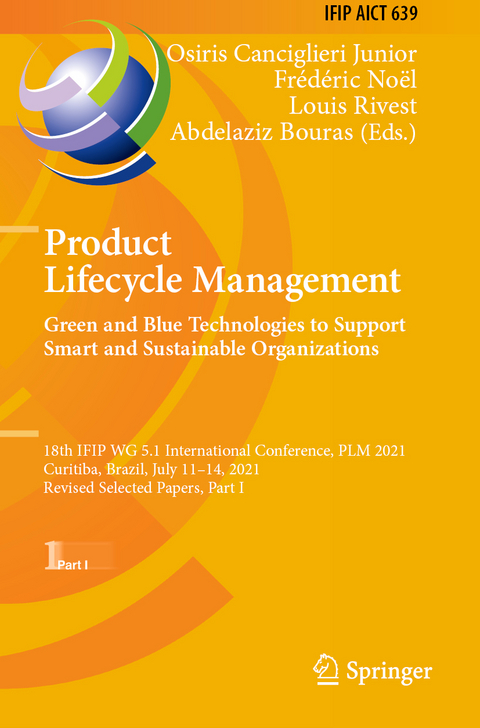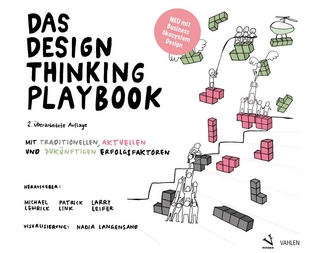
Product Lifecycle Management. Green and Blue Technologies to Support Smart and Sustainable Organizations
Springer International Publishing (Verlag)
978-3-030-94337-0 (ISBN)
The two-volume set IFIP AICT 639 and 640 constitutes the refereed post-conference proceedings of the 18th IFIP WG 5.1 International Conference on Product Lifecycle Management, PLM 2021, held in Curitiba, Brazil, during July 11-14, 2021. The conference was held virtually due to the COVID-19 crisis.
The 107 revised full papers presented in these proceedings were carefully reviewed and selected from 133 submissions. The papers are organized in the following topical sections:
Volume I:
Sustainability, sustainable development and circular economy; sustainability and information technologies and services; green and blue technologies; AI and blockchain integration with enterprise applications; PLM maturity, PLM implementation and adoption within industry 4.0; and industry 4.0 and emerging technologies:
Volume II:
Design, education and management; lean, design and innovation technologies; information technology models and design; and models, manufacturing and information technologies and services.
Sustainability, Sustainable Development and Circular Economy.- Classification based on Machine learning to Support Decision Making in E-commerce for Reverse Logistics.- Impacts of the Sustainable Automotive Chain: Faced with the perspective of electromobility in consolidated markets in Germany, United States and Japan.- A Comparative Study on Material Selection for Designing an Electric Last Mile Vehicle for Parcel Delivery.- Strategic Planning Model of the Integrated Development Process for Sustainable Products (PEPDIPS): qualitative and quantitative assessment.- The human-centered product-service development process allied to sustainability.- Disruptive innovation: digital transformation and sustainability approaches.- Biomimicry concepts used as an environmentally friendly solution for the selection of waste for health services.- Integrated product development process and green supply chain management - Proposal for a preliminary model.- Sustainability and Information Technologies & Services.- Methodology for Commodity Cost Estimation Through Production Line Analysis and Simulation.- Conceptual design methodology for knitted fabrics.- Management of Laser-Cut Sheet-Metal Part Using Collaborative Robots.- Financial assistance in a capital-constrained cellphone supply chain.- Application of the AKO Agile Tool for Biomimetic Product Development: A Proposal to Improve Lids Fixation for Household Appliances.- Sustainable Software Engineering: an empirical study of the Brazilian financial sector.- Analysis and modeling the intersection of Design for X techniques, Business strategies and Product Life-cycle Management.- Methodology to enhance the lifetime of mechanical system by utilizing parametric accelerated life testing.- An initial exploration of Lean and Sustainable Development with a focus on Service.- Manufacturing Oriented Service Development Process Framework: Theoretical Construction. -Green and Blue Technologies.- Island Detection for Distributed Photovoltaic Systems: a Review of Methods and a Simulation Analysis.- Approach to the Green Multi-objective Vehicle Routing Problem in Logistic Distribution.- Digital management of large building stocks: BIM and GIS integration-based systems.- Sustainable Product Development for discarded materials reuse: U-TURN approach.- Requirements and barriers in the process of food export from Brazil to Europe.- An Approach for Extension of a Digital Business Ecosystem by Digital Twin.- Managing New Product Development in the Fashion Industry with PLM: a Market Server Based Classification.- The repurchase intention of organic food: comparison between a theoretical and a nested model.- The Sustainable Production Chain and the Practice of Corporate Social and Environmental Responsibility.- AI & Blockchain Integration with Enterprise Applications.- Barriers of blockchain technology adoption in viable digital supply chain.- Artificial Intelligence Framework for Electrode Wear Prediction in Resistance Spot Welding.- Assessing the Predictions of Machine Learning Algorithms in an Industrial Application Through Counterfactual Generation.- Anomaly Detection in Blockchain-enabled Supply Chain: An Ontological Approach.- InnoCrowd, an AI based optimization of a crowdsourced product development.- Applied Artificial Intelligence: Risk Mitigation Matters.- Smart Contracts Implementation based on Bidirectional Encoder Representations from Transformers.- Digital Twin Proposal to Support Remote Learning for Engineering.- Blockchain-based Manufacturing Supply Chain Management using HyperLedger Fabric.- Comparative evaluation of product and service solutions in the context of Product-Service Systems and Technical Inheritance.- Proposal of a Fair Voting Classifier Using Multi-Objective Optimization.- Sequencing through a global decision instance based on a neural network.- Impact Assessment of Ensemble-Based Unbalance Handling Techniques for Credit Scoring.- PLM Maturity, PLM implementation and Adoption within Industry 4.0.- Enabling collaborative lifecycle engineering of smart products and services by an adaptive innovation infrastructure.- Review of PPX business models: Adaptability and feasibility of PPX models in the equipment manufacturing industry.- Building Bridges: Development of a Redlining interface between VR and PDM.- Evaluation of performance attributes for a leagile supply chain based on the SCOR model dimensions through the TOPSIS method.- Integration and Prioritization of Digital Transformation Projects in a World Class Manufacturing: an approach based on multicriteria methods.- Maturity Models and Cost Justification for PLM: A Case Study in the Plant Engineering Industry.- Evaluating the Maturity of MBE Application.- User Experience of PLM-Systems Analysis of the Current State of Research.- Industry 4.0 and Emerging Technologies.- Improving Design of Enabling Collaborative Situation Based on Augmented Reality Devices.- Systematic for Process Improvement Using Cyber-Physical Systems and Toyota Kata.- Manufacturing Execution System as an integration backbone for Industry 4.0.- Challenges to Information Requirements Development during Digital Twin Creation and the Role of Systems Requirements Engineering.- An Activity-Based Costing Model for Additive Manufacturing.- Industry 4.0 in the rescue of PLM in pandemics: Towards a Smart Digital Agile PLM.- Towards a new society: Solving the dilemma between Society 5.0 and Industry 5.0.- Toward an adaptive approach to implement predictive maintenance in metallurgical industry SMEs through IoT and AI.
| Erscheinungsdatum | 14.02.2023 |
|---|---|
| Reihe/Serie | IFIP Advances in Information and Communication Technology |
| Zusatzinfo | XVIII, 551 p. 212 illus., 154 illus. in color. |
| Verlagsort | Cham |
| Sprache | englisch |
| Maße | 155 x 235 mm |
| Gewicht | 866 g |
| Themenwelt | Informatik ► Software Entwicklung ► User Interfaces (HCI) |
| Informatik ► Theorie / Studium ► Künstliche Intelligenz / Robotik | |
| Mathematik / Informatik ► Mathematik ► Finanz- / Wirtschaftsmathematik | |
| Schlagworte | Artificial Intelligence • Blockchain • circular economy • Computer-Aided Design (CAD) • Digital transformation • Emerging Technologies • green and blue technologies • Industry 4.0 • Information Technology • information technology models • internet of things • LPM implementation • Product design • product manufacturing • Signal Processing • Software Design • Software engineering • sustainability • sustainable development • Telecommunication Systems |
| ISBN-10 | 3-030-94337-2 / 3030943372 |
| ISBN-13 | 978-3-030-94337-0 / 9783030943370 |
| Zustand | Neuware |
| Informationen gemäß Produktsicherheitsverordnung (GPSR) | |
| Haben Sie eine Frage zum Produkt? |
aus dem Bereich


